|
|
|
Sort Order |
|
|
|
Items / Page
|
|
|
|
|
|
|
| Srl | Item |
| 1 |
ID:
137329
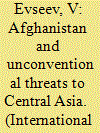

|
|
|
|
|
| Summary/Abstract |
THE STATES OF CENTRAL ASIA faced the Afghan problem practically right in the wake of the disintegration of the Soviet Union. It first showed in ideas of radical Islam trickling into them with the resumption of ties with Uzbek and Tajik relatives who lived in Afghanistan. Uzbekistan's President Islam Karimov managed to limit the negative impact of this process. Things, however, were totally different in Tajikistan where for the duration of civil war Afghanistan was in effect a hinterland base for the irreconcilable opposition.
|
|
|
|
|
|
|
|
|
|
|
|
|
|
|
|
| 2 |
ID:
113595


|
|
|
| 3 |
ID:
123195
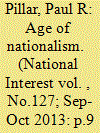

|
|
|
|
|
| Publication |
2013.
|
| Summary/Abstract |
THE URGE to apply era-defining labels to global affairs is strong and enduring. A label and a few easy-to-understand attributes associated with it can impart a reassuring simplicity to what is actually a complex and often-intractable reality. While the disadvantages of era labeling, including oversimplification, are probably as great as the advantages, the practice is here to stay.
|
|
|
|
|
|
|
|
|
|
|
|
|
|
|
|
| 4 |
ID:
101104
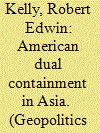

|
|
|
|
|
| Publication |
2010.
|
| Summary/Abstract |
US grand strategy after 9/11 turned from post-containment drift to preemption. But the costs are high - suspicion of American power, hedging by traditional allies, expensive, go-it-alone ventures like Iraq. Tried-and-true containment better reflects American values. While forward in the world, containment is also defensive. It reassures skittish partners and reflects liberal, anti-imperial US preferences. In Asia, containment would deter the primary contemporary challengers of US power - radical Islam and Chinese nationalism - without encouraging a Bush-style global backlash. In a reductive analysis of US alliance choices, this article predicts a medium-term Indo-American alliance. India uniquely shares both US liberal democratic values and the same two challengers; it is the likely pivot in a US-backed neo-containment architecture in Asia.
|
|
|
|
|
|
|
|
|
|
|
|
|
|
|
|
| 5 |
ID:
163109
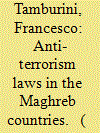

|
|
|
|
|
| Summary/Abstract |
This article sheds light on the counter-terrorism measures enacted by the Maghreb countries, with a comparative approach of the laws in Algeria, Mauritania, Morocco, and Tunisia. Carried out by comparing the Arabic and French original versions, the analysis revealed a common attitude that tended to preserve national security at the expenses of civil freedoms and human rights. In almost all cases, anti-terrorism laws strayed away from their supposed initial finality – fighting terrorism – tackling other issues such as the maintenance of public order or indirectly the control of dissidence and political opposition, with no or scarce legal checks and balances that could restrict possible police or judiciary abuses towards civil and political rights. The legal measures significantly delayed both the first transition to democracy in the region in the 2000s as well as the promising development after the ‘Arab spring’.
|
|
|
|
|
|
|
|
|
|
|
|
|
|
|
|
| 6 |
ID:
153107
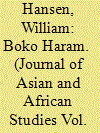

|
|
|
|
|
| Summary/Abstract |
This article is interested in shedding light on why a phenomenon such as Boko Haram came into existence and why it poses a threat to the very existence of the Nigerian state. The Boko Haram phenomenon, I argue, can only be understood as a reaction to more than a half century of corruption, venality, poverty, and abuse by the state predator class. My argument is that Boko Haram is the entirely logical consequence of more than five decades of the post-colonial Nigerian state ruled by a parasitic predator class that is itself a by-product of the colonial state.
|
|
|
|
|
|
|
|
|
|
|
|
|
|
|
|
| 7 |
ID:
095426
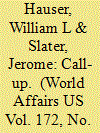

|
|
|
| 8 |
ID:
089568
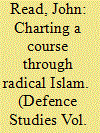

|
|
|
| 9 |
ID:
083729
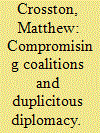

|
|
|
|
|
| Publication |
2008.
|
| Summary/Abstract |
This article investigates the development of democracy in Tajikistan and analyzes what has earned it the most international acclaim: its secular-Islamic governing coalition. The investigation reveals a compromised and illegitimate coalition that, with American collusion in local regime repression, poses great dangers to international security. The article argues that government repression, leading to increasing radicalization, combines with foreign aid to damage long-term democracy potential in Tajikistan but also works against global security interests by creating doubt about American intentions and possibly allowing a concomitant rise in Islamic radicalism
|
|
|
|
|
|
|
|
|
|
|
|
|
|
|
|
| 10 |
ID:
138330
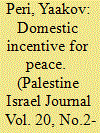

|
|
|
|
|
| Summary/Abstract |
Immediately after the polls closed, when Israel opened its eyes to an old new political reality, it was clear that the critical issues of sovereignty regarding the Palestinians will inevitably return again to the forefront. As a result, the window of opportunity which is open in the Middle East will be highlighted for all to see. The last Israeli elections, like a number of elections in the last decade, began with a clarion call to tackle social issues, economic issues and other internal matters, but in practice, the items most on the public agenda during the public campaigns were those of security and negotiations.
|
|
|
|
|
|
|
|
|
|
|
|
|
|
|
|
| 11 |
ID:
144956
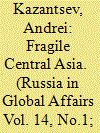

|
|
|
|
|
| Summary/Abstract |
Today post-Soviet Central Asian countries are facing problems caused by old security challenges and the emergence of completely new threats. These threats may hamper the future of secular statehoods in the region and present a serious obstacle to modernization.
|
|
|
|
|
|
|
|
|
|
|
|
|
|
|
|
| 12 |
ID:
072987
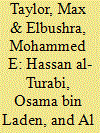

|
|
|
|
|
| Publication |
2006.
|
| Summary/Abstract |
This research note explores the events and circumstances surrounding Osama bin Laden's stay in Sudan from 1991 to 1996. In particular, it discusses the role that the Sudanese politician, Hassan al-Turabi may have played in the development of bin Laden and al Qaeda. It draws particular attention to the role of the Popular Arab and Islamic Congress (PAIC) in the emergence of a distinctive form of Radical Islam and offers a preliminary discussion of the emergence of particular qualities of al Qaeda ideology.
|
|
|
|
|
|
|
|
|
|
|
|
|
|
|
|
| 13 |
ID:
113261
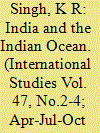

|
|
|
|
|
| Publication |
2010.
|
| Summary/Abstract |
India has not had a policy specific to the Indian Ocean beyond the knee-jerk and ad hoc responses to the changing regional and global environment. The Indian Navy, however, played a significant part in formulating the maritime perspective vis-à-vis the Indian Ocean and in dovetailing it with the country's larger foreign policy objectives in the region. Owing to ill-advised responses to interventions from both within and outside the region, India faced near isolation in the Indian Ocean region during the second half of the Cold War era. India's sensitivity to new opportunities and concerns about emerging threats to the stability of the region have brought about a change in India's relationships after the end of the Cold War. At present, India's policy seems to be motivated by priorities such as energy security, war on terror and maritime security. As a major regional power and enjoying greater credibility than during the Cold War era, India should act as a facilitator to build structures of maritime cooperation in the Indian Ocean region that can help integrate the littoral states and thus pave the way for a firmer foundation for a future peace zone in the Indian Ocean.
|
|
|
|
|
|
|
|
|
|
|
|
|
|
|
|
| 14 |
ID:
083583
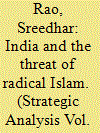

|
|
|
| 15 |
ID:
137314
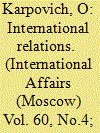

|
|
|
|
|
| Summary/Abstract |
TODAY, the world is living amid global changes in which political realities "are shaped, to an increasing degree, by global political instability, a product of erosion of the Westphalian system and increasingly chaotic international relations. They provide the background against which a new multipolar world order is being shaped."1 The system of international relations is gradually slipping toward anarchy2 amid the mounting crisis of the idea of a "democratic world," the pivotal concept of the unipolar world.
|
|
|
|
|
|
|
|
|
|
|
|
|
|
|
|
| 16 |
ID:
123344
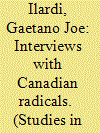

|
|
|
|
|
| Publication |
2013.
|
| Summary/Abstract |
Based on in-depth interviews with seven Canadian radicals in 2011, this article provides a detailed and nuanced insight into these men's personal journeys into, and in some cases, exit from, the world of radical Islam. Reflecting on their motivation, emotions, and decision-making processes, these men's stories demonstrate that the radicalization experience is anything but straightforward in the sense of there being a single and unambiguous motivation that spurs individuals on. Rather, they reveal that they were drawn to, and remained involved with, the world of extremism for a variety of reasons, not all of which necessarily related to the existence of grievances, real or imagined. Moreover, the relative importance of these drivers appeared to be in a state of flux, depending on an individual's needs or circumstances at any given time. Indeed, the highly idiosyncratic and temporally specific nature of the radicalization process, as demonstrated by these men's accounts, does not bode well for government and law enforcement efforts to anticipate specific cases of radicalization.
|
|
|
|
|
|
|
|
|
|
|
|
|
|
|
|
| 17 |
ID:
151873
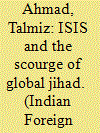

|
|
|
| 18 |
ID:
122228
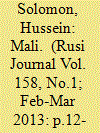

|
|
|
|
|
| Publication |
2013.
|
| Summary/Abstract |
For over a decade Mali has been viewed as a poster child of good governance, secularism and tolerance and as a bulwark against radical Islam. Yet three inter-related sources of insecurity - Tuareg nationalism, the rise of Islamism and the nature of Mali's post-independence state - coalesced to bring about a takeover of northern Mali by Islamist forces. The rise of the Islamists, in turn, prompted Western - predominantly French - and regional intervention. Looking beyond the current intervention, Hussein Solomon argues that only a more holistic approach can prevent a repeat of this tragedy.
|
|
|
|
|
|
|
|
|
|
|
|
|
|
|
|
| 19 |
ID:
086413
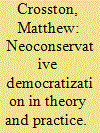

|
|
|
|
|
| Publication |
2009.
|
| Summary/Abstract |
Neoconservative democratization took on new life after 9/11: the United States should be a global guarantor of liberty, even if coercing this freedom. The justification was a hybrid of liberal democratic peace and realist national security. However, this aggressive democratization is contradictory: the philosophical foundation is insincerely decorated by liberal language that overlooks damaging compromises when ideology is put into practice. Uzbekistan, with whom a close partnership in the war against terror was developed and then was further deepened along supposedly democratic development lines, is used as a critical case study. In short, the contradictions in neoconservative ideology create flaws in policy implementation that do not create smoother paths to development, prevent democratic consolidation and weaken American security interests.
|
|
|
|
|
|
|
|
|
|
|
|
|
|
|
|
| 20 |
ID:
118761
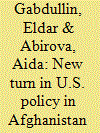

|
|
|
|
|
|
|
|